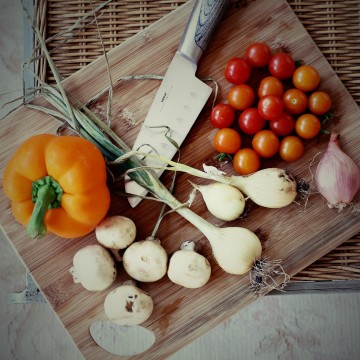 Going vegan was one of the best decisions I’ve ever made. My overall health and energy levels skyrocketed, and I began living more in line with my values. My choice to go vegan started with a minor health scare and immersing myself in books like The China Study by T. Colin Campbell. A winding path lead me to a vegan lifestyle, as well as a rewarding new career helping others transition to veganism.
Going vegan was one of the best decisions I’ve ever made. My overall health and energy levels skyrocketed, and I began living more in line with my values. My choice to go vegan started with a minor health scare and immersing myself in books like The China Study by T. Colin Campbell. A winding path lead me to a vegan lifestyle, as well as a rewarding new career helping others transition to veganism.
But just because I embraced a more compassionate way of living, didn’t mean I immediately achieved emotional balance or centeredness. For years, I had experienced stress, anxiety and depression, and countless medications didn’t seem to help. While a vegan lifestyle made me happier knowing that I was doing less harm in the world, I needed to explore other options to deal with my negative thinking patterns and feelings of inexplicable misery.
I’m one of those people whom medications don’t seem to help. But I’m fortunate to remain highly productive and functioning, regardless of how depressed I’m feeling. One at a time, I decided to go off my medications, sensing there had to be a more effective way to improve my mood and stop letting thoughts of despair run my life.
Mindfulness is the state of being aware of your senses and feelings in each moment. When I felt miserable, I didn’t particularly want to take the time to examine those feelings. But practicing mindfulness, and the attention it requires, has helped me cope far better with depression than with any medication. It has enabled me to bridge the gap between the beauty in the world and my own internal darkness, letting in a glimmer of light. It allows me to more clearly recognize what’s important in life. Mindfulness has helped me see opportunities to thrive that I never could have found in any combination of prescription drugs.
Here are a few simple ways I overcame depression through becoming a more mindful vegan.
1. Eliminate Clutter
I tend to think of household clutter like stress; the more of that junk I can eliminate, the better.
Just a few weeks ago, far in the back of one of my kitchen cabinets, I was grossed out to find a gigantic bottle of fish sauce from my pre-vegan days. There it was, taking up precious space in my kitchen, along with old spices, and no-longer-usable storage containers.
De-cluttering your home, and your kitchen in particular, helps to create more space and minimize distractions. This not only allows you to focus better, but actually helps you appreciate what you have. And the more you appreciate the good things you have, the happier you will feel.
2. Prep and Eat Deliberately
In the past, I could easily plow through a bag of tortilla chips and guacamole without even thinking about it (or even sitting down). Oftentimes, I wasn’t even that hungry, I was simply avoiding actual food preparation.
It’s easy to be happy in the obvious moments of joy: winning a game, seeing a great film, taking in a beautiful landscape. What’s more challenging is enjoying the process. But I’m convinced that figuring out how to enjoy the tasks of daily life like chopping carrots or driving to work is the key to happiness.
Instead of mindless eating, notice your feeling and actions while you prepare and eat your food. Try to look at each ingredient with fresh eyes. Recognize the smells, tastes and textures. Admire the beauty of fresh ingredients. Chew slowly and taste every bite. Think of it as an eating meditation. Notice how you feel after eating a healthy meal. You don’t need to do this every time you eat, but even bringing a few minutes of mindfulness to one meal a day helps.
Food preparation and eating don’t have to be tasks to complete. They can be meaningful experiences themselves. And these experiences add up to a happy life.
3. Listen Carefully
I used to get a sick feeling in my stomach when I’d read acquaintances’ pro-meat or pro-hunting posts on social media. While I still find these things repulsive, I’ve tried to listen more closely. Perhaps they’re simply uninformed, creatures of habit, distanced from their own emotions, or all of the above. Rather than worrying about how I’m going to challenge them or create a perfect comeback, I listen carefully and experience more compassion for them.
Much of what we hear around us resembles noise. By tuning into it and allowing yourself to truly listen to what’s going around you, you’re less likely to worry about future outcomes or potential scenarios. Instead, you remain in the here and now. Our thinking can sometimes resemble a stream of social media posts. Words and images flying by while we pay only partial attention. Try not to judge it. Just become aware of what you’re seeing and how it makes you feel, and go from there. If that doesn’t help, a few deep, focused breaths can work wonders.
The great thing about these mindfulness techniques is they don’t take up any more of your time. They simply enrich the time you’re already spending. The rewards of these small, mindful gestures can transform your emotions and improve your well-being.
How can you be more mindful in your everyday life? Share in the comments below!
Related: 7 Ways to Practice Mindfulness in Daily Life
How I Lost 70+ lbs By Accidentally Becoming a Vegan
__
Photo: Jeremy Jenum via Flickr




